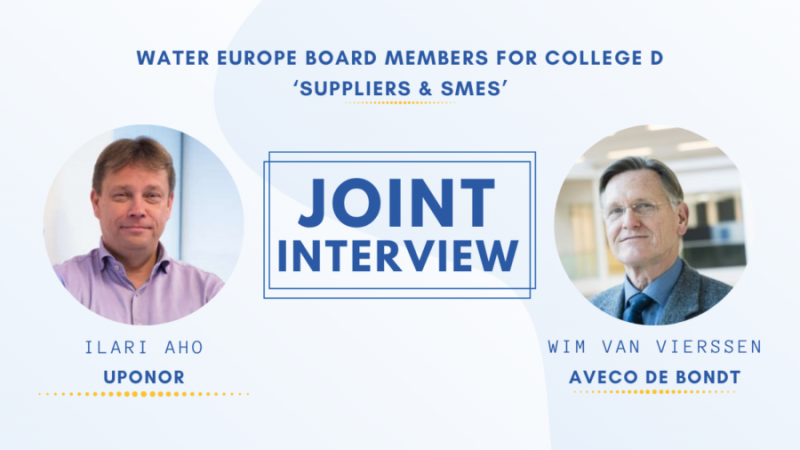Joint Interview with Wim van Vierssen & Ilari Aho – Water Europe Board Members
Published on by Water Network Research, Official research team of The Water Network in Social
Joint Interview with Wim van Vierssen & Ilari Aho – Water Europe Board Members for College D ‘Suppliers & SMEs’

You were recently elected as Water Europe board members of college D ‘Suppliers & SMEs’- Could you tell us what drives you personally to have this role at Water Europe? What do you want to achieve?
Wim: I have worked for many years of my career at universities and knowledge institutions. From that background, I was also a College B member of Water Europe for years. There I learned how much time and money it takes to get innovative research off the ground. I am now active as a consultant at a commercial engineering company that is a member of College D, the world of SMEs and technology suppliers. In the classical view, there is a large gap between an innovative idea and the market, the so-called Valley of Death. I would like to contribute to help bridge that gap.
Ilari: I am and have been for all my career passionate about innovation, sustainability and the role businesses play in improving our society. The water business is a fantastic mix of these, as we work with a resource that is essential to all human and natural life, and our businesses can make a big difference in safeguarding and preserving it. Water Europe is positioned in the centre of delivering a better world through business, policy and technology innovation, and having the possibility to serve on the WE board is an opportunity to personally contribute to this transition.
Representing the solutions providers at Water Europe, which ones do you consider the key challenges and the most burning needs of this college and how do you contribute to addressing these in the context of Water Europe?
Ilari: As with almost all business sectors, one of the most important challenges that solution providers face is increasing and speeding up early market adoption of innovative solutions. In sectors that are based on critical long service life assets, such as the water sector, this requires finding models for sharing the financial and technical risks associated with innovation, and collaborative and co-creative development models across the value chain. I believe that a broad cross-industry community such as the WE membership can overcome these challenges by creating new types of innovation partnerships, and I would aspire to contribute to this development.
Wim: The main challenge is that you have to do business yourself. Our members can do that like no other. Water Europe can, however, support its members in matters beyond their own strength. For example, when mapping out what the future needs of the water sector could be. Think of energy efficiency, water storage as an instrument against the effects of prolonged dry spells, sustainable desalination and advanced digital solutions. The adaptability of water infrastructure poses an additional challenge due to climate change. But innovations are difficult to predict. Not even by Water Europe. So, we are here to always give support to enthusiastic members who work in their own way every day.
Encouraging innovation in the water sector is vital. How important do you consider the role of SMEs in this regard and what are the existing opportunities for the uptake of their innovations to the next level both inside and outside of Europe?
Wim : I think SMEs are the missing link between academic research and the market. Innovative companies are by their nature very aware of what needs to be done to make their idea marketable. But even then, that is a complex matter. I personally believe in creating a much more innovative ecosystem by challenging our major European multi-national water companies to assist innovative SMEs to gain access to the European market and even beyond that. The path up for an SME is difficult and takes a lot of stamina and determination. Such partnerships could help. Water Europe may facilitate such partnerships among its members, but also beyond.
Ilari: A large part of technology innovation, indeed, has its origin in one way or another in SMEs. The SME challenge is related to their typically limited access to broader markets and limited resources for business development. Large, established corporations can in turn provide access to new markets for SME innovations, and extend their outreach to new customer groups. Facilitating and supporting this interaction and partnering between SMEs and large corporations could be a valuable leverage for European innovations.
Based on our vision, Water Europe aims to build a Water-Smart Society. From your point of view, which actions shall we put forward to make this happen and how could the solution providers contribute to that?
Ilari: I think the key again is in collaboration across the value chain. By bringing together solution providers, utilities, water users, the research community, and other partners, we will be able to much better identify and specify the problems that require smart solutions both in the short and long term. Solutions are after all only as valuable and important as the problems they address.
Wim: A water-smart society recognizes the role of water as a primary factor for prosperity and well-being. Such a society deals consciously and sparingly with water, but also ensures that water of the right quality is available at the right time for various purposes, such as drinking water, industrial water or water for nature. Given the dynamics associated with climate change, this is a complex care task. There are great opportunities for solution providers because of the enormous task. We are talking about a great diversity of solutions, products and services. Incidentally, I think that in such a world of water checks and balances digital services are becoming increasingly important.
Taxonomy
- Business Development
- Business Development